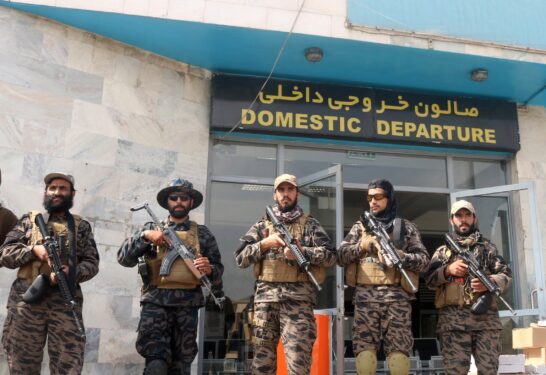
‘There’s Going to be a Bloodbath’
WINDSOR TERRACE — As the bloody, contentious U.S. evacuation of Afghanistan approached its Aug. 31 deadline, fears rose about the ultimate fate of Catholics and Christians under Taliban rule if they are unable, or unwilling, to flee.
“When the U.S. is totally out, there’s going to be a bloodbath. We just have to pray that God will protect people’s lives,” said Faith McDonnell, director of advocacy for Katartismos Global, an Anglican organization in Manassas, Va., that speaks out on religious freedom issues.
[Related: As U.S. Presence in Afghanistan Ends, Catholics Call to Welcome Refugees]
“There doesn’t seem to be any way that it will be good for Christians. They will be hunted down and killed by the Taliban,” McDonnell said in late August.
Ali Ehsani, an Afghan Christian living in exile in Rome, knows first-hand the suffering Christians have endured at the hands of the Taliban.
“When I was five years old, the Taliban burned my house down. The Taliban found out we were Christian. I lost my family. Only my brother and I were left,” said Ehsani, now 32, speaking through an interpreter.
Three years later, when Ehsani was eight, he and his then-17-year-old brother were able to get out of Afghanistan. They settled in Rome, where Ehsani eventually earned a law degree.
“For Christians, the Taliban makes life hard. There is constant pressure to convert to Islam. Christians talk about Jesus all the time. But they do it in secret. You cannot be open about it,” he said.
Nadine Maenza, chair of the U.S. Commission on International Religious Freedom (USCIRF), said in a statement: “The Taliban’s imposition of their harsh and strict interpretation of Sunni Islam in the areas that they have taken over poses a grave threat to all Afghans of differing interpretations and other faiths or beliefs. The outlook for the country’s religious minorities is particularly bleak.”
Christians are a tiny minority in predominantly Islamic Afghanistan, numbering 20,000 out of a total population of 38 million people, according to most estimates. Catholics are an even smaller minority within that group; in 2018, their population was estimated at 200, according to Angelus, a Catholic news site.
The Italian embassy in Kabul housed the only Catholic chapel in the entire country. “The embassy of Italy had been the focal point for all of the Christian Catholic life,” said Ed Clancy, director of outreach for Aid to the Church in Need, a Brooklyn-based group that supports churches around the world.
The Italian government recently closed the embassy and evacuated the personnel there.
Ehsani, who via WhatsApp had befriended a Catholic family that was stuck in Afghanistan, reached out to Italian officials in Rome for help in securing safe passage for them. “They were outside the airport in Kabul. They could not get permission to get in and get on a plane. They felt panic,” he said.
Ehsani also issued a public appeal to Pope Francis to save the family, whom he did not name, fearing for their safety. The family consists of a mother and her five children.
Finally, last week, the Italian military got the family safely onto a plane for a flight to Italy. A humanitarian organization called Fondazione Meet Human is looking after them there.
“The first thing they wanted to do was walk into a church. It was emotional for them,” Ehsani said.
The focus of most Christian religious freedom organizations in this crisis has been to obtain safe passage out of Afghanistan for Christians. The physical and bureaucratic hurdles include obtaining the documents needed to leave the country.
On Aug. 2, the U.S. State Department created a new emergency designation, P-2, in its Refugee Admissions Program for Afghan nationals to expedite their passage. But the P-2 designation does not include religious minorities.
The USCIRF has urged the Biden Administration to “broaden the recent P-2 designation to explicitly include Afghan religious minorities, in recognition of the severe risks they already face, which will only heighten after the end of the U.S. evacuation,” Commissioner Frederick A. Davie stated.
Even if an applicant’s paperwork is in order, getting into the airport in Kabul can be a treacherous undertaking, Clancy said.
“Right now, the goal of almost everyone is to get to the airport so that they can evacuate safely,” he said. “It’s chaos. There are groups within 100 meters of the gate with full documentation who can’t get to the gate to get in.”
In fact, approaching the gate proved deadly on Aug. 26 when two suicide bombings targeted thousands of people attempting to flee Afghanistan. The attacks killed scores of Afghans as well as 13 U.S. soldiers deployed to expedite and safeguard evacuation efforts.
Catholics and Christians who escape into countries like neighboring Pakistan, India, or locations in the Middle East could face hardships, Clancy said, adding that Aid to the Church in Need is working with churches in those countries to assist refugees.
“If they go to those places, then they’re probably going to need some special help if they’re Christians,” he said. “They’re landing in places where they’re not in a good position. They’re [going to be] a religious minority,” he said.
The chaos and danger notwithstanding, there are Christians who are choosing to remain in Afghanistan.
“We are working on helping Christians, but some of the Christians have just said that this is what God has called them to do. So they’re staying,” McDonnell said. “They need our prayers.”

“……..fate of Catholics and Christians”, I had to stop reading with that hateful comment. Catholics are CHristians and were indeed the FIRST Christians, that Protestants branched out from.
What a crazy ignorant comment.